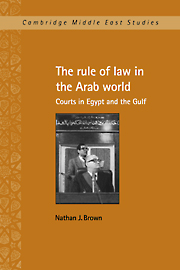Book contents
- Frontmatter
- Contents
- Preface
- Glossary
- 1 Arab courts in comparative perspective
- 2 The creation and operation of the modern Egyptian legal system, 1876–1937
- 3 Egyptian courts., 1937–1971: centralization, authoritarianism, and socialism
- 4 Egyptian courts, 1971–1996: the reemergence of liberal legality
- 5 Legal reform in the Arab states of the Gulf
- 6 The legal system and the rule of law in Kuwait and Qatar
- 7 Popular uses of the courts
- 8 Business and the courts
- Conclusion
- Bibliography
- Index
Conclusion
Published online by Cambridge University Press: 23 October 2009
- Frontmatter
- Contents
- Preface
- Glossary
- 1 Arab courts in comparative perspective
- 2 The creation and operation of the modern Egyptian legal system, 1876–1937
- 3 Egyptian courts., 1937–1971: centralization, authoritarianism, and socialism
- 4 Egyptian courts, 1971–1996: the reemergence of liberal legality
- 5 Legal reform in the Arab states of the Gulf
- 6 The legal system and the rule of law in Kuwait and Qatar
- 7 Popular uses of the courts
- 8 Business and the courts
- Conclusion
- Bibliography
- Index
Summary
At the beginning of this study, three questions were posed concerning the social and political role of courts in the Arab world. It is now possible to advance answers to each of the questions.
First, why did Egypt's political leaders construct and maintain an independent judicial system that might seem to limit their own authority? Those accounts of legal and judicial reform in Egypt (or more generally) that stress imperialism, liberalism, or legitimation are not so much incorrect as incomplete. Imperialism did shape the course of Egyptian legal development during the late nineteenth and early twentieth centuries, if often indirectly. The timing and structure of legal reform in Egypt, however, reveal that the primary impetus was domestic. Even when imperialism played a role, legal development was often a tool that served to resist or contain imperialism rather than enforce it. Similarly, liberalism has played a role in Egyptian legal history, and the Egyptian judiciary has at times emerged as a force for liberal legality. Liberal legality in Egypt, however, has never been predicated on the idea of a minimalist state, and has generally operated within sharply denned limits. Finally, while the legal system has served to support existing political authority, the legitimating function of law has been greatly exaggerated. It is true that at times the political leadership has adopted an ideology based on the rule of law, but there is little empirical evidence that the actual institutions associated with the rule of law have generated popular support for, or acquiescence in, the political order. Such ideologies are probably better understood not as hegemonic but as aiding only in fostering coherence and unity of political vision among the political leadership.
- Type
- Chapter
- Information
- The Rule of Law in the Arab WorldCourts in Egypt and the Gulf, pp. 236 - 244Publisher: Cambridge University PressPrint publication year: 1997



